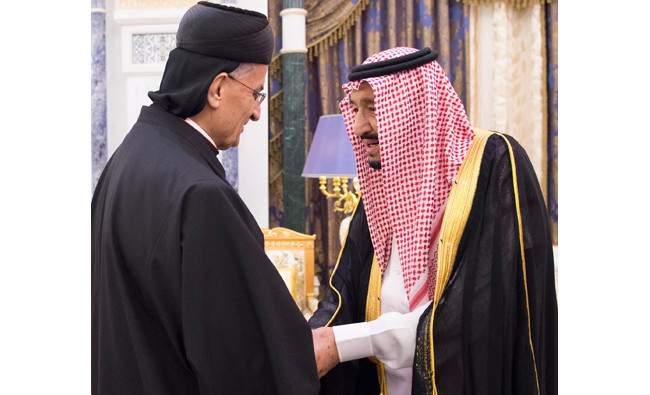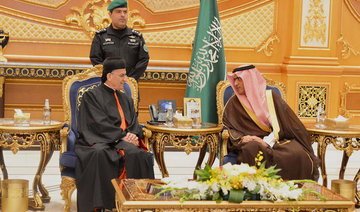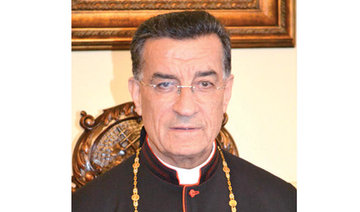JEDDAH: King Salman received, Tuesday, the Lebanese Maronite Patriarch Beshara Boutros Al-Rahi in his office at Al-Yamamah palace in Riyadh.
During the meeting, they reviewed the fraternal relations between the Kingdom and Lebanon and stressed the importance of the role of different religions and cultures in promoting tolerance, renouncing violence, extremism, terrorism and achieving security and peace for the peoples of the region and the world.
The meeting was attended by Minister of Interior Prince Abdulaziz bin Saud bin Nayef bin Abdul Aziz, Minister of State and Cabinet’s Member Musa’ed bin Mohammed Al-Aiban; Foreign Minister Adel Al-Jubeir and Minister of State for Arab Gulf Affairs Thamer Al-Subhan.
King Salman receives Lebanese Patriarch Maronite Beshara Al-Rahi
King Salman receives Lebanese Patriarch Maronite Beshara Al-Rahi

Founding nations sign Global Water Organization charter in Riyadh

- Ceremony was attended by Saudi FM Prince Faisal bin Farhan, who highlighted the importance of the GWO in tackling water issues worldwide
- Prince Faisal said that Saudi Arabia would provide financial and logistical support to the GWO for the next five years
RIYADH: The Global Water Organization officially launched operations from its headquarters in Riyadh on Wednesday, with founding member states signing the organization’s charter.
The ceremony was attended by Saudi Foreign Minister Prince Faisal bin Farhan, who highlighted the importance of the GWO in tackling water issues worldwide through a holistic approach, the Saudi Press Agency reported.
“The launch of the Global Water Organization affirms Saudi Arabia’s commitment to strengthening international initiatives and addressing global challenges through partnerships based on cooperation between countries and governments,” Prince Faisal said.
“The Kingdom looks forward to the organization becoming an international platform that drives sustainable solutions and supports developing nations in enhancing their water capabilities,” he said.
Prince Faisal said that Saudi Arabia would provide financial and logistical support to the GWO for the next five years, emphasizing that collective action was essential to achieving shared objectives. Prince Faisal invited all countries and private-sector entities to join the organization.
Minister of Environment, Water and Agriculture Abdulrahman Al-Fadley took part in the ceremony and emphasized that the signing of the Global Water Organization’s charter and the launch of its operations from Riyadh reinforced shared international responsibility to preserve water resources.
Al-Fadley added that the importance of the organization stemmed from water being not just a resource, but a source of economic and social development and stability worldwide.
He described the organization as “not just a platform that brings countries together, but a collective global mind working to develop and integrate the efforts of countries and organizations to address water challenges comprehensively.”
“The Global Water Organization will lead international efforts to address water-related challenges and transform traditional water management approaches. These challenges go beyond water scarcity to ensure its availability at the right time and place and recognize its impact on the economy, public health, food security and supply chains, especially in the face of climate change,” he said.
He emphasized the importance of having an integrated system that covered all stages of the water cycle, adopting innovative economic models based on cost-benefit analysis, introducing new financing mechanisms, reducing reliance on government subsidies, and actively involving the private sector.
The GWO’s charter was signed by representatives from founding countries: Saudi Arabia, Kuwait, Qatar, Spain, Senegal, Pakistan, Greece and Mauritania.
The organization aims to strengthen the efforts of countries and organizations to address water challenges.
Book Review: ‘A Shining’ by Jon Fosse

Jon Fosse, the 2023 Nobel laureate, delivers a masterclass in existential minimalism with “A Shining,” a novella that glimmers with metaphysical unease.
Translated from Norwegian by Damion Searls, this brief but resonant work lingers like a half-remembered dream, inviting readers to grapple with its haunting ambiguity.
An unnamed man drives into a remote forest, seeking isolation. When his car stalls, he abandons it, lured deeper into the trees by an enigmatic light. What begins as a quest for solitude spirals into a disorienting confrontation with the unknown.
Strange encounters — a flickering figure, disembodied voices, a persistent glow — blur the boundaries of reality. Is the “shining” a divine sign, a mental rupture, or something beyond comprehension? Fosse offers no easy answers.
Fosse’s sparse, rhythmic prose mirrors the protagonist’s fractured psyche. Sentences loop and stutter, mimicking the repetitive chatter of a mind unraveling (“I walked, I walked, I walked”).
Yet, within this austerity lies startling beauty: Descriptions of moss, shadows and cold air ground the surreal in the realm of the sensory.
The novella probes humanity’s existential contradictions, particularly the tension between our desire for solitude and our terror of abandonment.
It lays bare the futility of seeking meaning in a universe indifferent to human struggles, while questioning how much we can trust our perceptions.
Are the protagonist’s encounters real, or projections of a mind teetering on the brink of collapse? Fosse leaves readers suspended in that uncertainty.
Fosse refuses to cater to conventional narrative appetites. There are no villains or heroic arcs, only a man wrestling with the void within.
Fans of Franz Kafka’s existential labyrinths or Samuel Beckett’s bleak humor will find kinship here.
“A Shining” is not for readers craving action or closure. It is a quiet storm of a book, best absorbed in one sitting under dim light.
Perfect for lovers of philosophical fiction, poetry devotees, and anyone who has ever stared into darkness and wondered what stared back.
Saudi FM receives US envoy to Syria in Riyadh

Saudi Arabia’s Foreign Minister Prince Faisal bin Farhan received US envoy to the Syrian Arab Republic Thomas Barrack in Riyadh on Wednesday.
During the meeting, they discussed steps to provide economic, humanitarian and other support to the Syrian people, the Saudi Foreign Ministry said in a post on X.
Meanwhile, Saudi Arabia’s Deputy Minister of Foreign Affairs Waleed Elkhereiji received Ambassador of Italy to the Kingdom Carlo Balducci in Riyadh on Wednesday.
They discussed bilateral relations and other topics of common interest.
Macron navigates rocky path to recognizing Palestinian state

PARIS: French President Emmanuel Macron is leaning toward recognizing a Palestinian state, but diplomats and experts say such a move may prove a premature and ineffective way to pressure Israel into moving toward a peace deal with the Palestinians.
They say it could deepen Western splits, not only within the already-divided European Union, but also with the US, Israel’s staunchest ally, and would need to be accompanied by other measures such as sanctions and trade bans if recognition were to be anything more than a symbolic gesture.
French officials are weighing up the move ahead of a United Nations conference, which France and Saudi Arabia are co-hosting between June 17-20, to lay out the parameters for a roadmap to a Palestinian state, while ensuring Israel’s security.
“Only a political solution will make it possible to restore peace and build for the long term,” Macron said on Wednesday during a visit to Indonesia.
“Together with Saudi Arabia, we will soon be organizing a conference on Gaza in New York to give fresh impetus to the recognition of a Palestinian state and the recognition of the State of Israel and its right to live in peace and security in this region,” added Macron.
If Macron does go ahead, France, home to Europe’s largest Jewish and Muslim communities, would become the first Western heavyweight to recognize a Palestinian state, potentially giving greater momentum to a movement hitherto dominated by smaller nations that are generally more critical of Israel.
Macron’s stance has shifted amid Israel’s intensified Gaza offensive and escalating violence by Israeli settlers in the West Bank, and there is a growing sense of urgency in Paris to act now before the idea of a two-state solution vanishes forever.
Any US-Iran deal should include ‘robust’ IAEA inspections: Grossi

- Tehran says may allow American inspectors from nuclear watchdog if an agreement is reached
VIENNA: Any deal between Iran and the US that would impose fresh nuclear curbs on Iran should include “very robust” inspections by the UN nuclear watchdog, International Atomic Energy Agency chief Rafael Grossi said on Wednesday.
The two countries are holding talks meant to rein in Iranian nuclear activities that have rapidly accelerated since President Donald Trump pulled Washington out of a 2015 deal between Iran and major powers that strictly limited those activities.
As that deal has unraveled, Iran has increased the purity to which it is enriching uranium to up to 60 percent, close to the roughly 90 percent of nuclear arms-grade, from 3.67 percent under the deal. It has also scrapped the extra IAEA oversight imposed by the 2015 pact.
“My impression is that if you have that type of agreement, a solid, very robust inspection by the IAEA ... should be a prerequisite, and I’m sure it will be, because it would imply a very, very serious commitment on the part of Iran, which must be verified,” Grossi said.
He stopped short, however, of saying Iran should resume implementation of the Additional Protocol, an agreement between the IAEA and member states that broadens the range of IAEA oversight to include snap inspections of undeclared sites.
Iran implemented it under the 2015 deal, until the US exit in 2018.
Asked if he meant the protocol should be applied, Grossi said “I’m very practical,” adding that this was not a subject in the talks. While the IAEA is not part of the talks, he said he was in touch with both sides, including US special envoy Steve Witkoff.
“I don’t think they are discussing it in these terms. I don’t see the discussion as being a discussion on legal norms to be applied or not. I tend to see this as more of an ad hoc approach,” said Grossi.
Iran, meanwhile, said it may consider allowing US inspectors with the IAEA to inspect its facilities if a deal is reached with the US.
“Countries that were hostile to us and behaved unprincipledly over the years — we have always tried not to accept inspectors from those countries,” Iran’s nuclear chief Mohammad Eslami said, referring to staff from the IAEA. Tehran “will reconsider accepting American inspectors through the agency” if “an agreement is reached, and Iran’s demands are taken into account,” he added.
Foreign Ministry spokesman Esmaeil Baqaei said that “consultations are ongoing regarding the time and location of the next round of talks, and once finalized, they will be announced by Oman.”
Eslami said: “The enrichment percentage depends on the type of use. When highly enriched uranium is produced, it does not necessarily mean military use,” he said.
Baqaei meanwhile said: “The continuation of enrichment in Iran is an inseparable part of the country’s nuclear industry and a fundamental principle for the Islamic Republic of Iran.”
“Any proposal or initiative that contradicts this principle or undermines this right is unacceptable.”

























